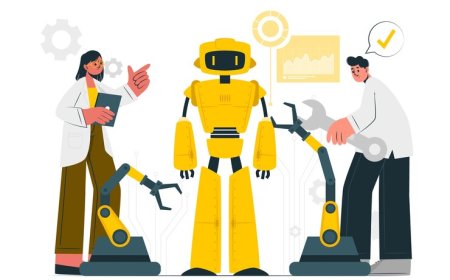Benefits of Using AI Software in the Industry
Learn the benefits of using AI software in the industry. Explore its impact on efficiency, productivity, automation, and decision-making

Have you ever thought about how AI software may affect different industries? will look at the great advantages of using AI software in the industry and how it may transform business processes. Whether you're a tech enthusiast a business owner, or simply interested in the implications of AI, come us on this amazing head into the field of AI software! AI software has many benefits, including increased efficiency and productivity, better decision-making, and improved consumer experiences. by looking into how AI software may make a major difference in your industry!
What is AI Software?
Before we go into the benefits, let's see what AI software is. AI software, or Artificial Intelligence software, means systems and applications that imitate human intelligence processes. These processes include learning, thinking, and self-correction. AI software can range from basic automation tools to advanced Machine Learning algorithms that forecast market trends. how AI software, AI solutions, and AI platforms are altering different industries.
1. Improved speed and productivity
One of the most important benefits of implementing AI software in the company is increased efficiency and production. AI Tools can automate monotonous work, freeing up employees' time for more complicated and creative aspects of their jobs. For example, in manufacturing, AI software can manage inventory, regulate quality, and even foresee maintenance needs, resulting in major downtime reduction and increased efficiency. AI businesses are creating cutting-edge AI solutions to optimize operations across multiple industries.
2. Improved decision-making
AI software offers firms tremendous data analysis capabilities. AI software enables businesses to make informed decisions by quickly and accurately evaluating massive amounts of data. In the banking industry, for example, AI software can evaluate market trends and forecast stock performance, allowing investors to make smarter investment decisions. Similarly, in healthcare, AI Applications can analyze patient data to help doctors diagnose disorders and prescribe treatments.
3. Cost Savings
Implementing AI software can lead to substantial cost savings for businesses. By automating routine tasks, companies can reduce labor costs and minimize errors, which can be costly to rectify. In customer service, for instance, AI-powered chatbots can handle a significant volume of customer inquiries, reducing the need for large customer support teams and improving response times. AI outsourcing is another cost-effective strategy where companies leverage external AI services for specific needs.
4. Enhanced Customer Experience
AI software plays a crucial role in enhancing customer experience. With AI-powered tools, businesses can provide personalized experiences to their customers. For example, e-commerce platforms use AI software to recommend products based on user preferences and browsing history, leading to higher customer satisfaction and increased sales. Similarly, AI technology in the travel industry can personalize travel itineraries based on individual preferences, making the travel experience more enjoyable. AI marketing strategies also help businesses tailor their outreach to target audiences effectively.
5. Predictive Maintenance
In industries such as manufacturing and logistics, predictive maintenance powered by AI software can be a game-changer. By continuously monitoring equipment and analyzing data, AI software can predict when a machine is likely to fail and schedule maintenance before a breakdown occurs. This proactive approach minimizes downtime, extends the lifespan of equipment, and reduces maintenance costs. AI development in this area is rapidly advancing, offering more accurate and reliable solutions.
6. Improved Supply Chain Management
AI software is revolutionizing supply chain management by optimizing various processes. By analyzing data from multiple sources, AI software can forecast demand, manage inventory levels, and optimize delivery routes. This results in reduced operational costs, improved efficiency, and better customer satisfaction. For example, AI software in the retail industry can predict product demand based on historical sales data and market trends, ensuring that the right products are available at the right time. AI deployment in supply chain systems is becoming increasingly common due to its effectiveness.
7. Enhanced Cybersecurity
With the increasing number of cyber threats, enhancing cybersecurity is a top priority for businesses. AI software can help detect and respond to security threats in real time. By analyzing patterns and identifying anomalies, AI software can detect potential security breaches and take proactive measures to prevent them. This is particularly important in industries such as finance and healthcare, where data security is paramount. AI integration with existing security systems can significantly bolster an organization's defense against cyber threats.
8. Personalization and Targeted Marketing
In the realm of marketing, AI software enables businesses to deliver personalized and targeted campaigns. By analyzing customer data, AI software can segment audiences and create personalized marketing messages that resonate with specific customer groups. This approach increases the effectiveness of marketing campaigns and boosts customer engagement. For instance, AI marketing tools can analyze user behavior and preferences to deliver personalized ads, resulting in higher conversion rates.
9. Innovation and Product Development
AI software fosters innovation by providing valuable insights into market trends and customer needs. By analyzing data from various sources, businesses can identify gaps in the market and develop innovative products and services to meet customer demands. In the automotive industry, for example, AI software is used to design autonomous vehicles and enhance driving safety features, paving the way for the future of transportation. AI project management tools can also streamline product development processes.
10. Workforce Empowerment
Contrary to the fear that AI software might replace jobs, it empowers the workforce by automating mundane tasks and freeing up time for more meaningful work. Employees can focus on strategic initiatives, creative problem-solving, and improving customer relationships. For instance, in the legal industry, AI software can handle document review and legal research, allowing lawyers to concentrate on case strategy and client advocacy. AI consulting services can help organizations implement AI strategies that enhance employee productivity.
11. Environmental Impact
AI software can also contribute to sustainability efforts by optimizing resource usage and reducing waste. In agriculture, AI software can analyze soil data, weather patterns, and crop health to recommend optimal planting and harvesting times, reducing resource wastage and improving crop yields. Similarly, AI software in energy management can optimize energy consumption in buildings, leading to lower energy costs and reduced environmental impact. AI cloud services are often more energy-efficient compared to traditional data centers.
Practical examples of AI software in action
-
Healthcare: AI software is being used to develop advanced diagnostic tools and personalized treatment plans, improving patient outcomes and reducing healthcare costs.
-
Finance: Financial institutions use AI software for fraud detection, risk assessment, and automated trading, enhancing security and efficiency.
-
Retail: E-commerce giants like Amazon use AI software to power recommendation engines, optimize inventory, and streamline logistics.
-
Manufacturing: Companies like General Electric use AI software for predictive maintenance, quality control, and process optimization, resulting in higher efficiency and reduced costs.
Challenges and Considerations
While the advantages of AI software are many, it is important to address potential issues and concerns. Implementing AI software requires a deliberate strategy
-
Data Privacy: Ensuring data privacy and compliance with regulations is crucial when using AI software that processes sensitive information.
-
Skill Development: Training employees to work with AI software and understand its capabilities is essential for successful implementation.
-
Ethical Considerations: Addressing ethical concerns, such as bias in AI algorithms, is important to ensure fair and unbiased outcomes.
The benefits of using AI software in the industry are huge and powerful. From increased speed and productivity to better decision-making and cost savings, AI software is changing the way businesses function. Businesses that adopt AI software may remain competitive, innovate, and provide better consumer experiences. As AI technology advances, its impact on multiple sectors will only increase, creating new possibilities and opportunities for organizations internationally.





































